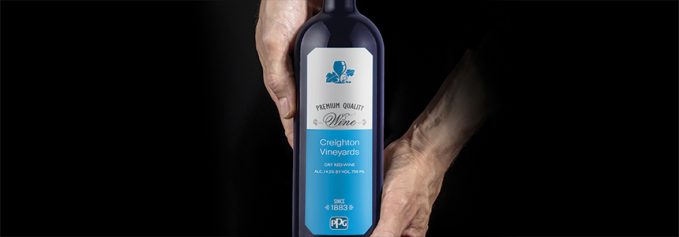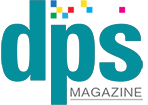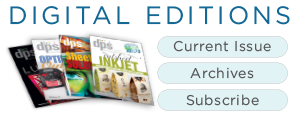
by Cassandra Balentine
As consumer expectations shift, the companies that serve them must also evolve. Brand owners increasingly demand high-quality labels with faster turnarounds. Further, they request shorter, more frequent runs. These needs are all met with digital printing equipment. Savvy label providers invest in digital printing and finishing equipment to ensure they never miss an opportunity.
Above: Abbott Label, headquartered in Dallas, TX, created these sample wine labels with a PPG Teslin substrate. 3. The Domino team at Abbott Label in front of the N610i.
Established in 2000 and headquartered in Dallas, TX, Abbott Label is represented nationwide, operating three additional manufacturing facilities in Atlanta, GA; Los Angeles, CA; and Chicago, IL. In total, its operation spans 210,000 square feet. The company currently staffs 180 employees, many of which have worked for the Abbott family for more than 30 years.
The company has a long, family history in the industry. John Abbott, president, Abbott Label, tells us his father, Jerry Abbott, started Metro Label in 1978. It grew into a nationwide business that could reach 90 percent of the population with next-day delivery. “When he sold Metro Label in 1998 to an investment banking firm, it had an EBITDA of 28 percent, which is remarkably high for the label industry,” he shares. Unfortunately, the company went bankrupt by 2004. “I joined Metro Label right out of college in 1985 and stayed with the company after the sale as national sales manager. I was let go in 2000 and started Abbott Label the same year. One door closes, another one opens,” shares Abbott.
Today, Abbott Label’s business model involves selling through resellers, not directly to brands. Its biggest customers are major packaging companies. It carries a full line of stocked labels—over 300 different sizes ready to ship out the same day—and it specializes in custom label options ranging anywhere from eight-color, 17 inch-wide labels to three-color, ten-inch wide work. “Abbott Label offers solutions for the wide run as well as the short run,” he states.
Digital Power
Digital printing capabilities allow Abbott Labels to address smaller run lengths and custom orders cost effectively. The provider operates two digital presses, an HP Indigo 6800 and a Domino N610i.
For finishing, coating capabilities run inline on its HP Indigo press. Die cutters are utilized for its stock labels. They also operate a Delta ModTech finishing with the Indigo and a Grafotronic finishing unit with the Domino press.
“Regardless of whether our customers need a long print run of high-quality, four-color process labels or extremely small print runs with variable content, we have the right print solutions,” exclaims Abbott.
In addition to its digital printing presses, the shop runs flexographic equipment—primarily from Mark Andy—in all four of its plants.
Abbott adds that the company does a lot of electronic data processing labels, so it also employs a fan folder and pinfeed equipment, which are capabilities a lot of its competitors do not offer.
Currently, approximately 25 percent of Abbott Label’s custom business is digital, and that is growing quickly.
Due to the coronavirus pandemic, the label provider is seeing a lot of orders for hand sanitizers, and the orders are getting bigger. “Companies who make gin and tequila are now transitioning to manufacturing hand sanitizers and of course they need new labels and they need them quickly—a perfect situation for digital,” notes Abbott.
The company started down the digital path about five years ago with the purchase of the HP Indigo 6800. “The HP prints great quality—no complaints whatsoever. We only wish it ran faster,” exclaims Abbott. When
the company invested in the HP Indigo, it also reviewed other presses, including a Domino label printer, but at the time there were not many units installed in the U.S. “My father taught me never to be a guinea pig, so I waited until the bugs and bumps had been worked out. Once we were maxed out on the HP—running three shifts, 24 hours a day—we took another look at Domino. We needed something faster and with a lower click rate. We did the research and having built great relationships in the industry over the years with great people, I could openly discuss pros and cons with friendly competitors. We purchased the Domino N610i in December 2019,” he shares.
The Domino is tapped to handle longer run applications with variable barcoding and consecutive numbering or copy changes. “The quality is slightly less than on the HP Indigo, although you can’t really tell by the human eye, and the speed is better. It’s great for chemical drum labels as well as labels for the food industry, craft beer, and industrial applications,” points out Abbott.
When deciding which platform to use, Abbott Labels looks at time on press. Anything between 15,000 and 40,000 feet would typically go on the Domino and anything between 15,000 feet or less—or demanding a higher level of quality—would go on the HP.
Shorter runs that demand higher quality are typically sent to the HP Indigo for production.
Abbott says the key to success in digital is three-fold. “You have to have a quality product or no one will do business with you, and you have to have competitive pricing, and you must offer outstanding service. This is a quick turnaround business and your organization and facilities have to be focused on this goal,” he states.
Media Considerations
In addition to having the right mix of equipment, Abbott Labels is well stocked on media options.
With the HP Indigo’s inline coating unit, it is able to utilize almost any substrate. However, most materials must be coated for the Domino press. “Fortunately, a lot of material vendors are coming up with new products that work beautifully with UV inkjet,” points out Abbott.
He says when it comes to finding new media options, it is active in the industry. “We’ve built great relationships with most of the materials vendors. They come to us quite often to test new media,” he shares.
The company is thorough when it comes to material testing, and is known for taking great notes that are useful to media manufacturers. “We carefully keep track of how the material runs and how fast we could run it. Formerly, media manufacturers would send someone to watch it run, but of course that’s more challenging these days as we are very strict about who can enter our facilities,” admits Abbott.
One media selection the provider is known to use is PPG Teslin. “It is a great, durable product,” shares Abbott, noting that he doesn’t find it comparable to a generic polypropylene. “It is a really good solution for chemical drums, wine bottles, racking labels—frankly, anywhere you need a durable label. We also see opportunity for Teslin labels in pharmaceutical applications because the material can withstand a range of sterilization methods as well as cryofreezing.”
Abbott Labels finds security and extreme durability are the key benefits of Teslin labels. The printed information and the label itself is difficult to remove—and even if it does, the label is destroyed—a great indication of tamper evidence. Teslin also don’t require a coating and runs on the Domino without issue.
As the Domino has only been running for six months, they’ve only had the opportunity to run sample labels on the press with Teslin material. “Our operators loved working with it, as it printed beautifully and didn’t require any extra modifications or adjustments. And best of all, reactions from our customers who received the samples have been very positive,” comments Abbott.
Each time you pick a label media, there is a cost-benefit decision that depends on the requirements of the job. “Specialty films like Teslin solve a problem. I find that it’s well worth the differential when the label calls for extra durability,” he adds.
Standing Out
The company’s long history and experience in the label industry has influenced its success. Today it runs three shifts, 24 hours a day throughout each operation. All of its plants have the same capabilities, with the exception of the digital presses, which are only in the home office. Stock is warehoused in all facilities.
Abbot Label is dedicated to service. For example, it operates about 275 different magnetic cylinder sizes for die cutting labels. “We run a lot of magnetic dies, so when we need a new one we always pay extra to get it shipped overnight from the manufacturer in order to meet customer requirements. Our competitors might take five to seven days to get a magnetic die,” he explains.
Additionally, its plants are strategically located near the facilities of major material providers, meaning it is faster to get materials shipped and turned around the same or next day. “We do a great job of keeping material and labels in stock for our customers. It’s the 80/20 rule with 20 percent of our inventory making up 80 percent of our sales. Our flexible warehousing policy enables us to react quickly and take care of our customers. We closely maintain inventory and keep track of what we’re using in order to make this model work,” offers Abbott.
While the COVID-19 pandemic presents challenges to many, Abbott Label is dealing with heightened demand. “Our volume has absolutely blown up and we can barely stay ahead of the demand. In particular we are seeing great volume from food and tamper-evident labels. As grocery shopping with companies like Amazon and Walmart has exploded, our orders are way up. We’re looking at bigger buildings and new equipment,” he shares.
Label Experts
A worldwide pandemic hasn’t slowed Abbott Labels. The company leverages its expertise, versatile equipment range, and substrate options to offer quality labels with fast turnaround times. dps
Oct2020, DPS Magazine



